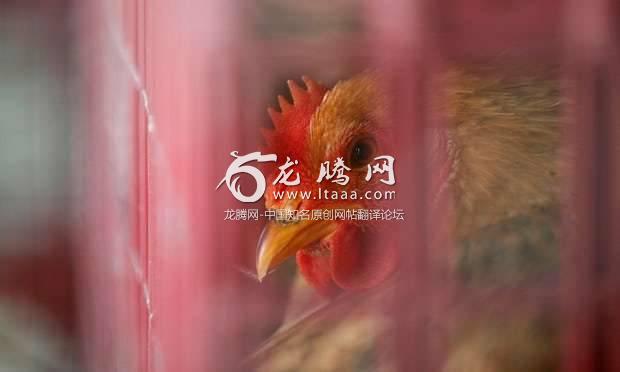中国确证首例人类感染H7N4禽流感病例 [英国媒体]
据中国官方媒体报道,一名来自中国东部省份的妇女被确认为第一例人类感染H7N4禽流感的病例。来自江苏的一名68岁患者,在圣诞节期间出现症状并被送往医院,目前已经康复。
China confirms first ever human case of H7N4 bird flu
中国确证首例人类感染H7N4禽流感病例
A 68-year-old patient from Jiangsu province, who has since recovered, developed symptoms on Christmas Day and was admitted to hospital
来自江苏的一名68岁患者,在圣诞节期间出现症状并被送往医院,目前已经康复。
China has confirmed first ever human case of H7N4 bird flu Photograph: Kin Cheung/AP
中国确证首例人类感染H7N4禽流感的病例。摄影:Kin Cheung/美联社。
A woman from eastern China has been confirmed as the first ever human case of H7N4 bird flu, according to Chinese authorities.
据中国官方媒体报道,一名来自中国东部省份的妇女被确认为第一例人类感染H7N4禽流感的病例。
Officials in Hong Kong have advised citizens to avoid wet markets, live poultry markets or farms if travelling to the mainland over the week-long lunar new year holiday which starts on Thursday.
香港的政府官员建议市民,如果在从周四开始的为期一周的春节假期期期间前往内地的话,应避免去农贸市场、活禽市场或农场。
The 68-year-old patient from Jiangsu province, who has since recovered, developed symptoms on 25 December, was admitted to hospital for treatment on 1 January and was released on 22 January.
这位来自江苏省的68岁患者,目前已经康复。她是于12月25日出现症状,其后于1月1日被准许入院治疗,1月22日出院的。
“She had contact with live poultry before the onset of symptoms,” Hong Kong’s centre for health protection (CHP) said in an alert on Wednesday evening. “According to a report from the Chinese centre for disease control and prevention, upon analysis, the genes of the virus were determined to be of avian origin.”
香港卫生防护中心(CHP)在周三晚间的一份警报中表示:“在出现症状之前,她曾接触过活家禽。根据中国疾病控制与预防中心的一份报告,经过分析,该病毒的基因被确认为禽流感的源头。”
A CHP spokesperson said the diagnosis had been confirmed earlier this week and added: “Travellers to the mainland or other affected areas must avoid visiting wet markets, live poultry markets or farms. They should be alert to the presence of backyard poultry when visiting relatives and friends.
香港卫生防护中心的一位发言人表示,诊断结果已于本周早些时候得到证实,并补充说:“前往内地或其他受影响地区的旅客必须避免前往农贸市场、活禽市场或农场。在拜访亲戚朋友时,他们应注意后院家禽的存在。”
“They should also avoid purchasing live or freshly slaughtered poultry, and avoid touching poultry/birds or their droppings. They should strictly observe personal and hand hygiene when visiting any place with live poultry.
“前往内地的旅客还应避免购买活家禽或刚宰杀的家禽,并且避免接触家禽/鸟类或其粪便。在参观任何有活家禽的地方时,应严格遵守保持个人及手部卫生。”
“Travellers returning from affected areas should consult a doctor promptly if symptoms develop, and inform the doctor of their travel history for prompt diagnosis and treatment of potential diseases,” the CHP alert said.
香港卫生防护中心警告称:“如果出现症状,从受影响地区返回的旅客应立即向医生咨询,并且告知医生他们的旅行史,以便能够得到及时诊断和治疗可能潜在的疾病。”
According to the US government’s centers for disease control and prevention (CDC) the most frequently identified subtypes of avian influenza known to have infected human beings are the H5, H7 and H9 viruses although such transmissions are rare. There are nine known subtypes of H7 viruses, of which H7N4 is one and in most cases human infection is uncommon.
根据美国政府疾病控制和预防中心(CDC)的数据,已知能感染人类的最常见的禽流感亚型是H5、H7和H9型病毒,尽管这些感染传播非常罕见。H7病毒存在9种已知的亚型,H7N4是其中的一种,在大多数情况下,这种亚型感染人类并不常见。
“The most frequently identified H7 viruses associated with human infection are Asian lineage avian influenza A(H7N9) viruses, which were first detected in China in 2013. While human infections are rare, these have commonly resulted in severe respiratory illness and death,” advice on the CDC website says.
美国政府疾病控制和预防中心(CDC)的网站建议:“与人类感染相关的最常见的H7病毒是亚洲系禽流感A型(H7N9)病毒,2013年首次在中国被检测发现。虽然人类感染非常罕见,但通常会导致严重的呼吸道疾病甚至是死亡。”
“In addition to Asian lineage H7N9 viruses, H7N2, H7N3, H7N7 virus infections have been reported. These viruses have primarily caused mild to moderate illness in people, with symptoms that include conjunctivitis and/or upper respiratory tract symptoms.”
“除了亚洲系的H7N9病毒外,被报道的还有H7N2、H7N3、H7N7型病毒感染病例。这些病毒主要是导致轻度到中度的疾病,症状包括结膜炎并发或单独的上呼吸道症状。”
Authorities have been concerned about the possibility of a potentially devastating human bird flu pandemic in Hong Kong since late 1997 when 18 locals were infected with the H5N1 virus, six of whom died.
自1997年年底以来,香港已有18名居民感染H5N1型禽流感病毒的病例,其中6人死亡,香港政府当局一直担心香港可能会爆发大规模人类禽流感的潜在危险。
On Wednesday the CHP said it would “remain vigilant and work closely with the World Health Organization and relevant health authorities to monitor the latest developments”. It urged citizens “to maintain strict personal, food and environmental hygiene”.
香港卫生防护中心于周三表示:“将时刻保持警惕,并将与世界卫生组织和相关卫生部门密切合作,以监测疫情最新进展”。他们还敦促市民“保持严格的个人、食品和环境卫生”。
版权声明
我们致力于传递世界各地老百姓最真实、最直接、最详尽的对中国的看法
【版权与免责声明】如发现内容存在版权问题,烦请提供相关信息发邮件,
我们将及时沟通与处理。本站内容除非来源注明五毛网,否则均为网友转载,涉及言论、版权与本站无关。
本文仅代表作者观点,不代表本站立场。
本文来自网络,如有侵权及时联系本网站。
图文文章RECOMMEND
热门文章HOT NEWS
-
1
最近,新冠肺炎疫情在日本有扩大的趋势,有专家呼吁日本应当举国行动起来,共...
- 2
- 3
- 4
- 5
- 6
- 7
- 8
- 9
- 10
推荐文章HOT NEWS
-
1
最近,新冠肺炎疫情在日本有扩大的趋势,有专家呼吁日本应当举国行动起来,共...
- 2
- 3
- 4
- 5
- 6
- 7
- 8
- 9
- 10











